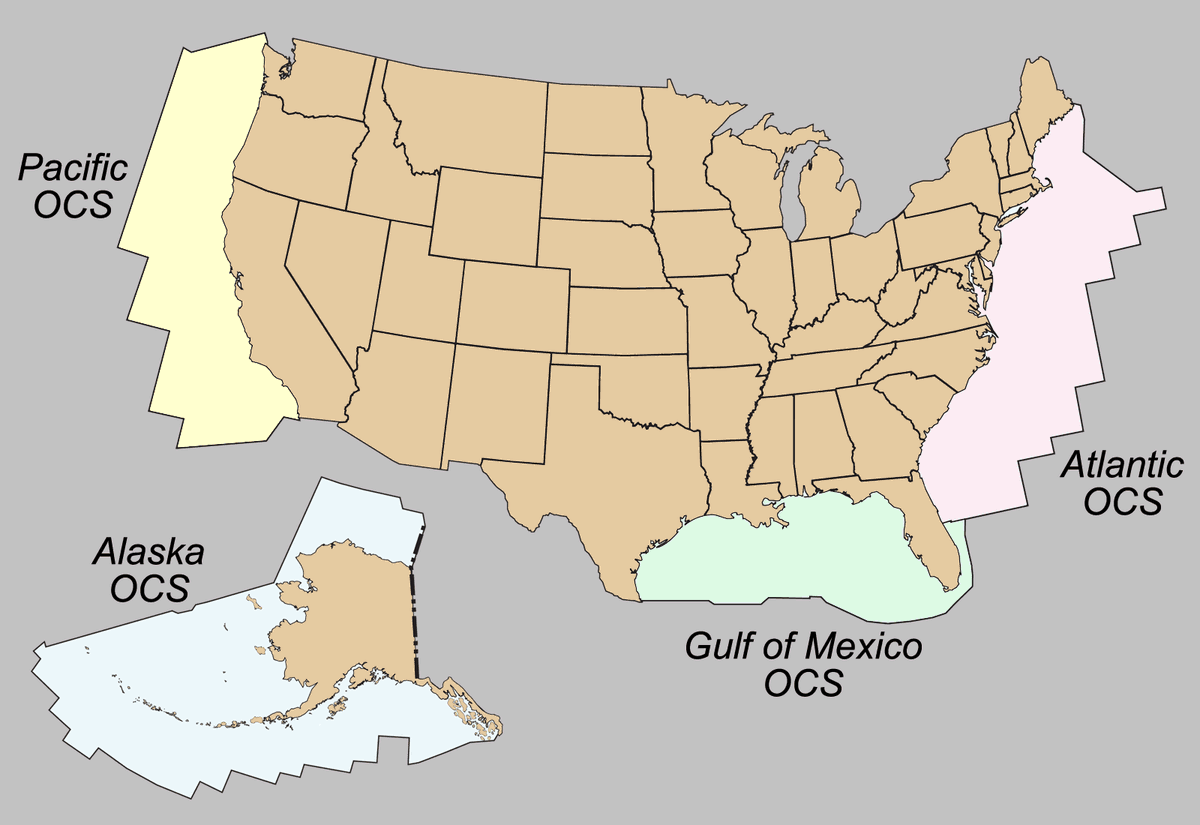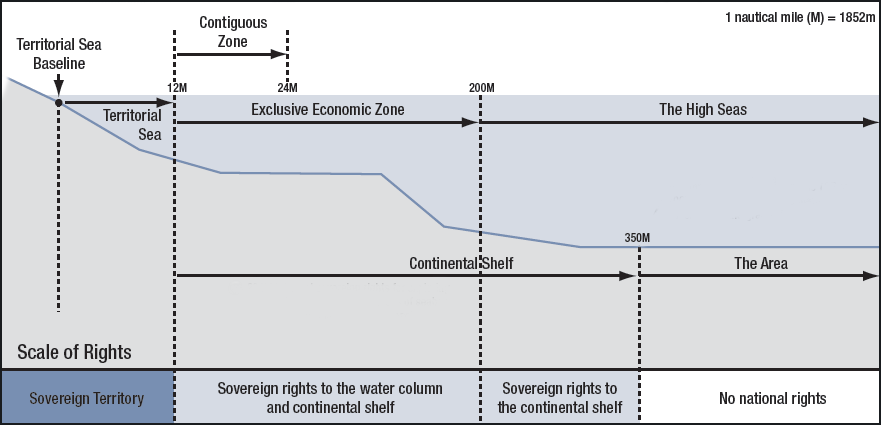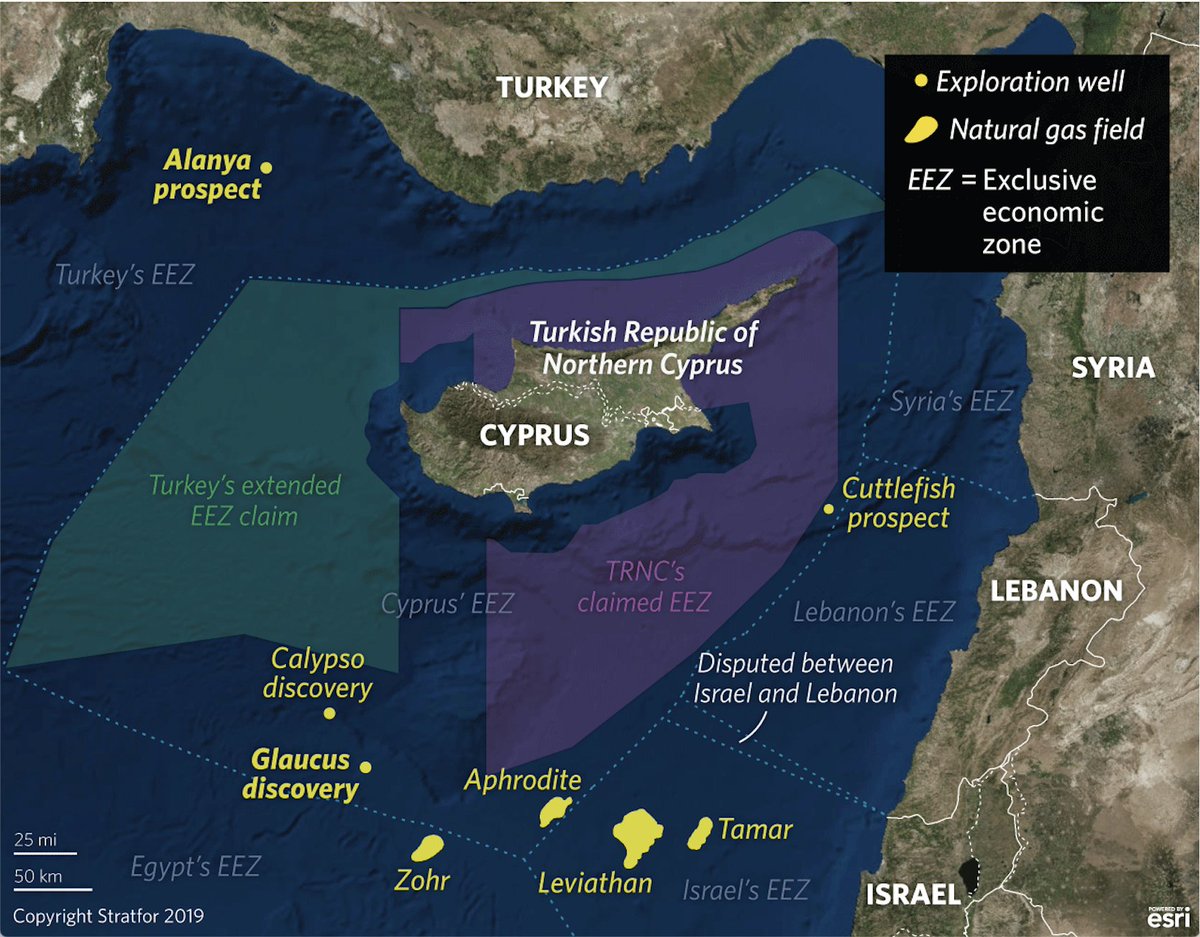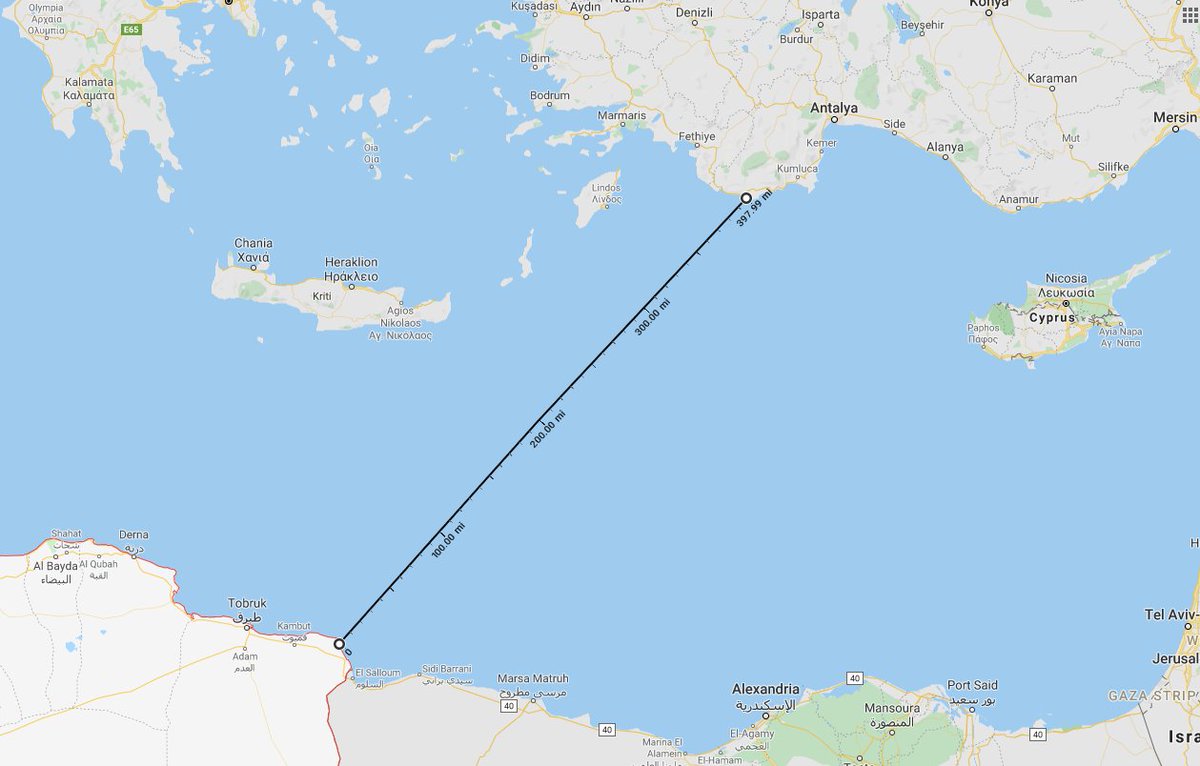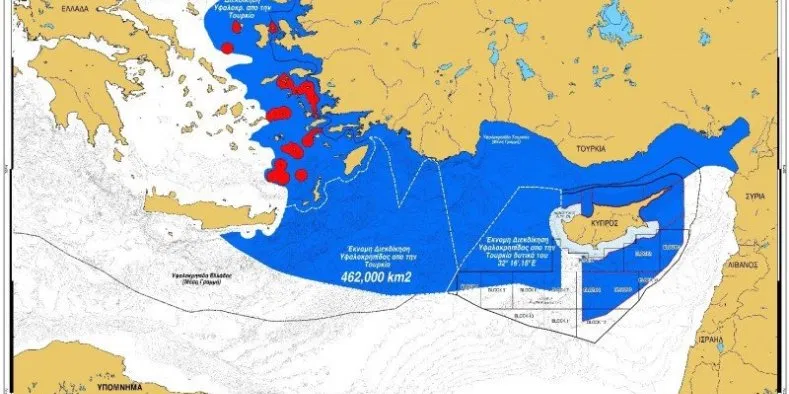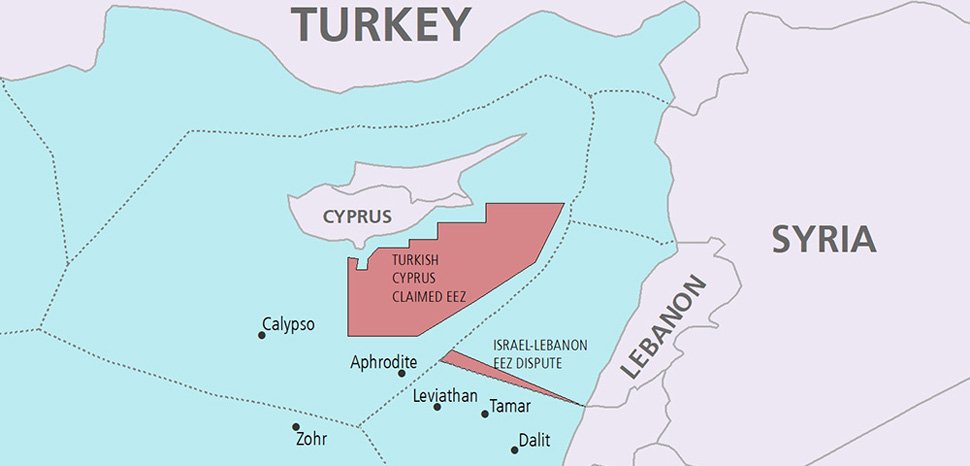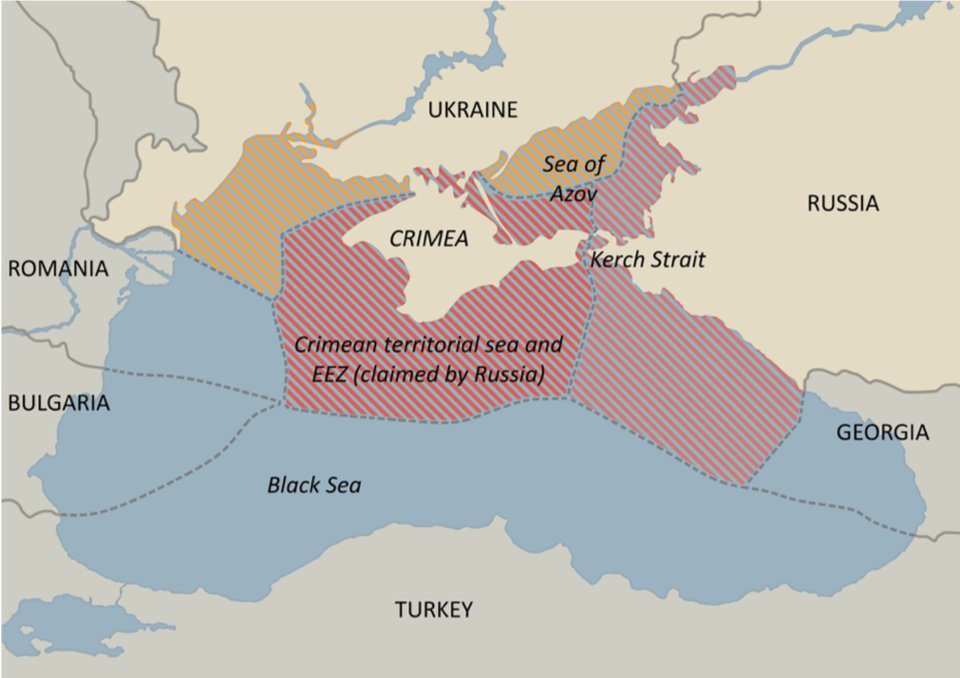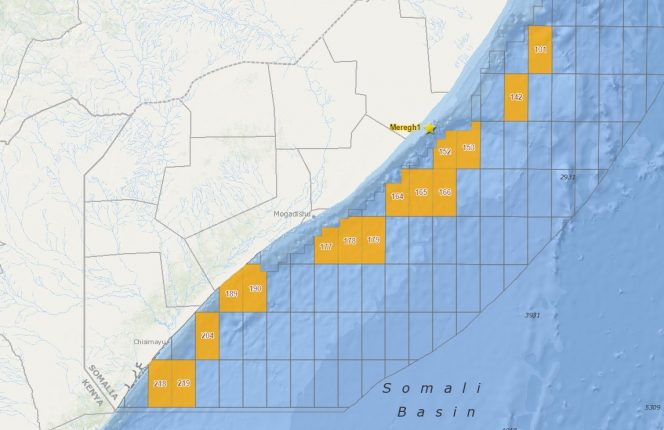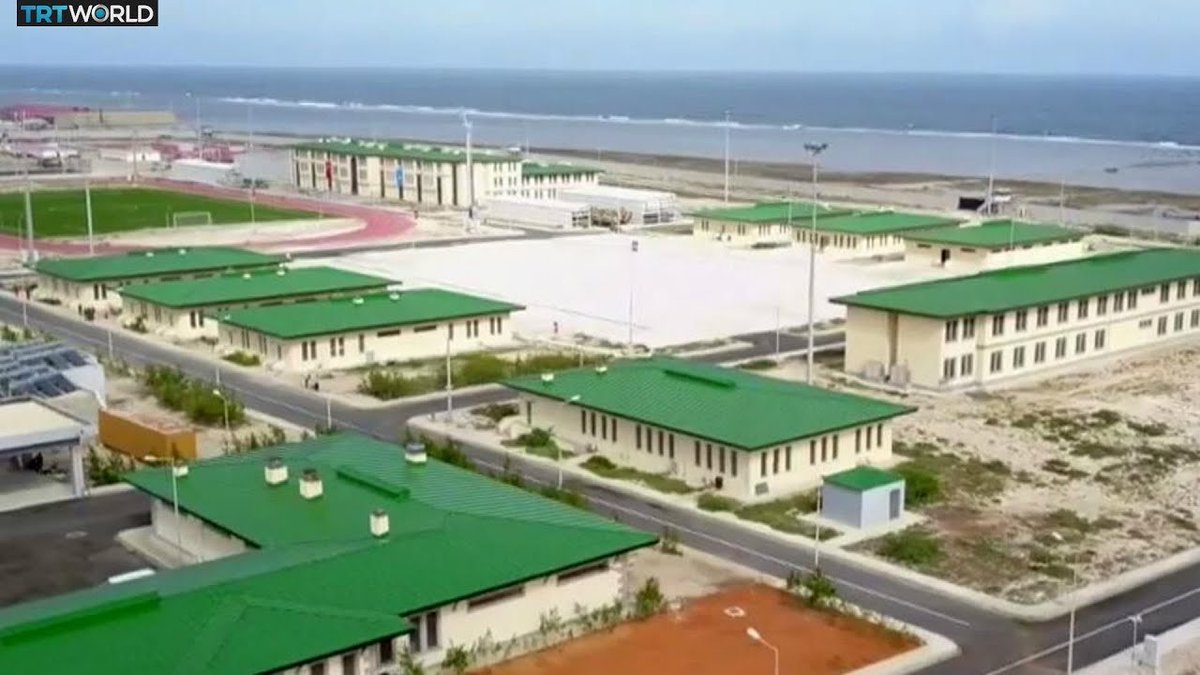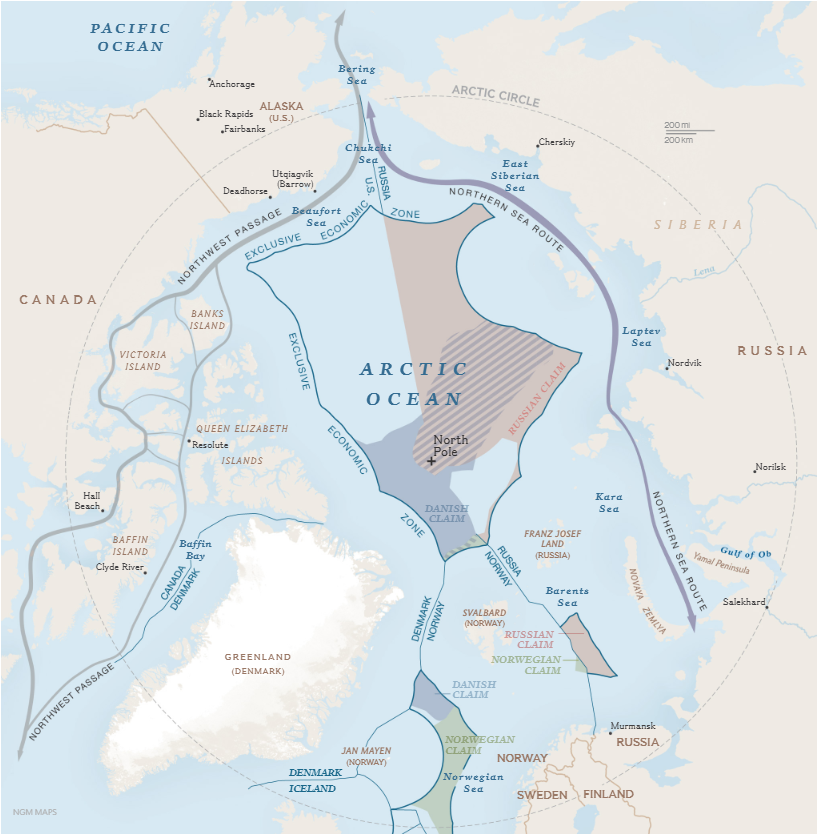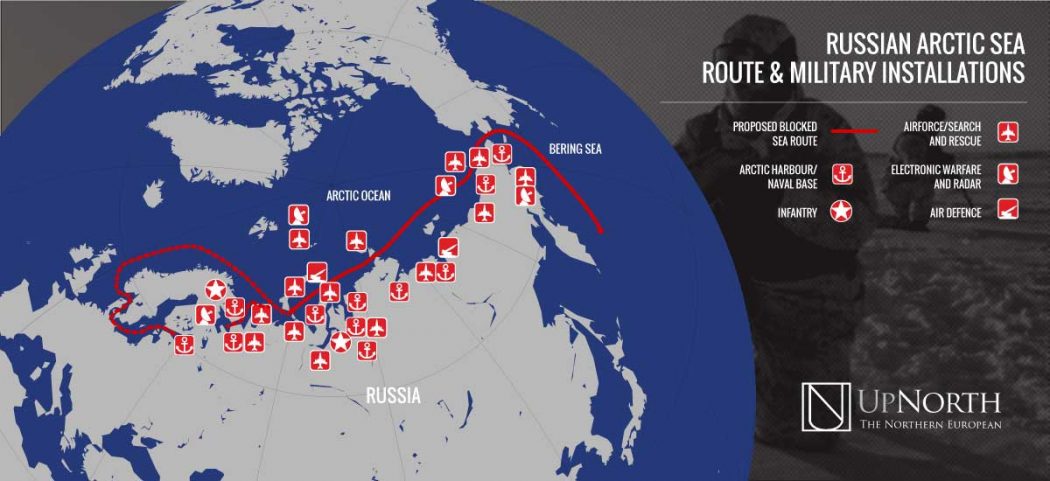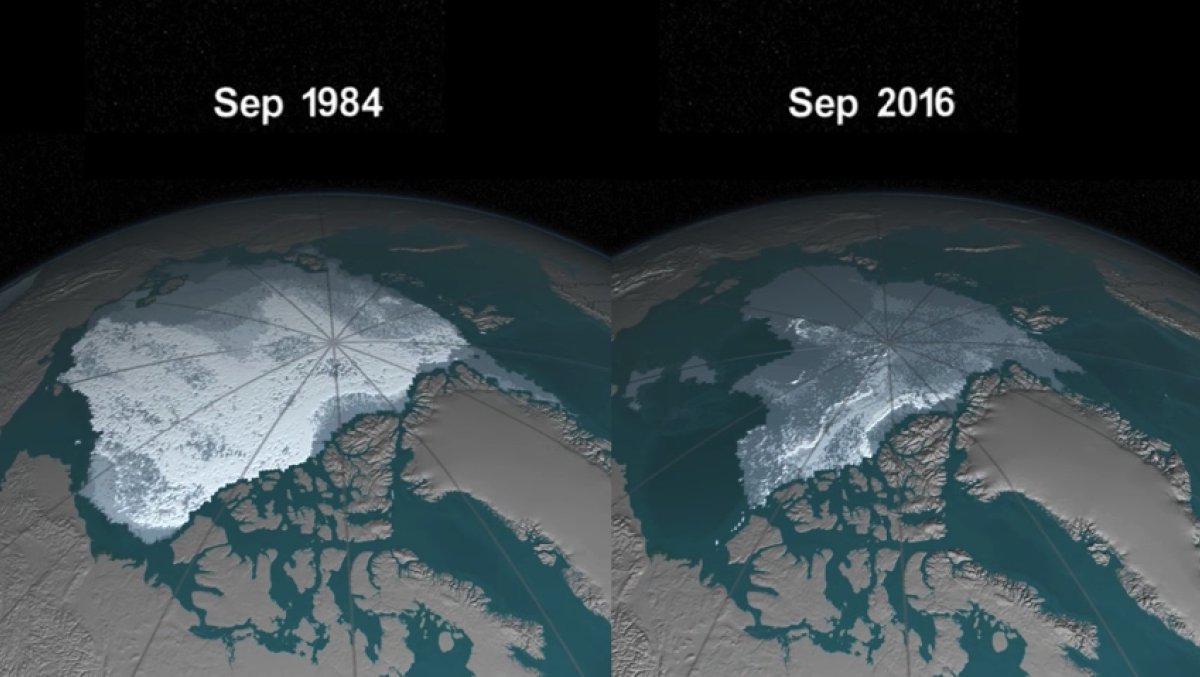𝐓𝐡𝐞 𝐄𝐄𝐙 𝐁𝐮𝐭𝐭𝐨𝐧
Food, energy, and water are the three things that sustain civilization - the oceans offer an abundance of each.
Established by the UN in 1982, Exclusive Economic Zones were created to resolve maritime disputes.
They have done anything but.
Thread.
Food, energy, and water are the three things that sustain civilization - the oceans offer an abundance of each.
Established by the UN in 1982, Exclusive Economic Zones were created to resolve maritime disputes.
They have done anything but.
Thread.
Prior to the adoption of the United Nations Convention on the Law of the Sea (UNCLOS) in 1982, maritime commerce and territorial disputes were settled via a complex maze of customs, agreements, laws, and treaties loosely called "admiralty law".
It worked, albeit messily.
2/
It worked, albeit messily.
2/
Often confused with the Law of the Sea concept, admiralty (or "maritime") law is the specific term for the body of laws and customs governing private matters of maritime commerce, such as shipping contracts, disposition of freight, and limits of liability.
3/
3/
As nations began to become more capable and efficient at mapping and exploiting the resources of the sea and beneath the seabed, conflicts inevitably arose.
This was further exacerbated by the disconnect between admiralty law and Law (or Freedom) of the Sea.
4/
This was further exacerbated by the disconnect between admiralty law and Law (or Freedom) of the Sea.
4/
Prior to UNCLOS I in 1958, nations largely adhered to the "cannon shot" rule - that is, territorial waters extended from the coastline out to 3 nautical miles, or what had traditionally been the range of a shore-based cannon.
Anything beyond was held as international waters.
5/
Anything beyond was held as international waters.
5/
This became non-viable in the 20th century as nations commenced drilling for oil and fishing further out to sea.
However, in 1945, the US was the first nation to extend a territorial claim out to the continental shelf, far beyond 3nm.
This was later codified in UNCLOS I.
6/
However, in 1945, the US was the first nation to extend a territorial claim out to the continental shelf, far beyond 3nm.
This was later codified in UNCLOS I.
6/
Under UNCLOS III, nations now manage a variety of sea zones:
Territorial Sea (12nm, sovereign)
Contiguous Zone (12-24nm, partially sovereign)
Exclusive Economic Zone (24-200nm, rights to resources)
Outside the Territorial Sea, a nation MUST allow passage of foreign ships.
7/
Territorial Sea (12nm, sovereign)
Contiguous Zone (12-24nm, partially sovereign)
Exclusive Economic Zone (24-200nm, rights to resources)
Outside the Territorial Sea, a nation MUST allow passage of foreign ships.
7/
Alright, you caught up now?
Pre-20th century, international maritime law basically was a gentleman& #39;s agreement often backed by ruthless force when commerce broke down.
Sea power was everything.
Now, power is projected via logistics, infrastructure, and regulatory capture.
8/
Pre-20th century, international maritime law basically was a gentleman& #39;s agreement often backed by ruthless force when commerce broke down.
Sea power was everything.
Now, power is projected via logistics, infrastructure, and regulatory capture.
8/
While UNCLOS III did in fact clarify and resolve certain challenges of the previous system(s), it privatized colonialism to a certain extent through oil/gas and fishing activity.
For countries like China, this works well:
https://twitter.com/man_integrated/status/1192489639547936768
9/">https://twitter.com/man_integ...
For countries like China, this works well:
https://twitter.com/man_integrated/status/1192489639547936768
9/">https://twitter.com/man_integ...
Further, UNCLOS III also opened up ambiguity on an issue that previously was plainly-understood:
What is an island?
Predictably, China exploited a linguistic loophole about "artificial" islands to begin its annexation of the South China Sea.
https://amti.csis.org/what-makes-an-island-land-reclamation-and-the-south-china-sea-arbitration/
10/">https://amti.csis.org/what-make...
What is an island?
Predictably, China exploited a linguistic loophole about "artificial" islands to begin its annexation of the South China Sea.
https://amti.csis.org/what-makes-an-island-land-reclamation-and-the-south-china-sea-arbitration/
10/">https://amti.csis.org/what-make...
Having previously covered China& #39;s activity in the South China Sea, I will not rehash here.
Simply note that it continues a trend by the legalistically-savvy nations of the world in capturing, bending, or outright weaponizing international law.
https://twitter.com/man_integrated/status/1195465368309059584
11/">https://twitter.com/man_integ...
Simply note that it continues a trend by the legalistically-savvy nations of the world in capturing, bending, or outright weaponizing international law.
https://twitter.com/man_integrated/status/1195465368309059584
11/">https://twitter.com/man_integ...
Whether by violence or by court games, ambitious nations and non-state actors alike will seek maximum control of resources.
Now, it is not just China who engages in war-by-bureaucratic-proxy, but the country has perfected and proliferated the playbook.
12/
Now, it is not just China who engages in war-by-bureaucratic-proxy, but the country has perfected and proliferated the playbook.
12/
An emerging "soft war" tactic involves the aforementioned Exclusive Economic Zones, where a country& #39;s claim to the sea& #39;s natural resources extends up to 200 nautical miles from its shore.
For nations that economically rely on these resources, EEZ& #39;s are critical.
13/
For nations that economically rely on these resources, EEZ& #39;s are critical.
13/
The Horn of Africa and northern Mediterranean coast are a region where EEZ& #39;s have become a flashpoint of regional tension.
One such example is the current civil war in Libya, which has sucked in numerous foreign powers.
https://twitter.com/man_integrated/status/1202206551819390977
14/">https://twitter.com/man_integ...
One such example is the current civil war in Libya, which has sucked in numerous foreign powers.
https://twitter.com/man_integrated/status/1202206551819390977
14/">https://twitter.com/man_integ...
Now, the real prize is not just the crude oil locked in Libya& #39;s ground.
It& #39;s also their 200nm EEZ.
The eastern Mediterranean Sea continues to betray its wealth of energy resources (especially natural gas), and Turkey has made the strongest play yet for it.
15/
It& #39;s also their 200nm EEZ.
The eastern Mediterranean Sea continues to betray its wealth of energy resources (especially natural gas), and Turkey has made the strongest play yet for it.
15/
On 5 Dec 2019, Libya& #39;s UN-backed leadership ratified a Memorandum of Understanding with Turkey with regard to their overlapping maritime claims east of Crete.
Despite enraging everyone else with an interest in the region, the maneuver was legal..or at least legal enough.
16/
Despite enraging everyone else with an interest in the region, the maneuver was legal..or at least legal enough.
16/
Here& #39;s the wrinkle - Turkey has never ratified UNCLOS, and has rejected it as a legal framework.
As far back as the 1970& #39;s, Turkey has held that its territorial waters extend to the limits of its continental shelf, well past the various provisions set by UNCLOS I.
17/
As far back as the 1970& #39;s, Turkey has held that its territorial waters extend to the limits of its continental shelf, well past the various provisions set by UNCLOS I.
17/
This issue is the root of the Greek/Turkish/Cypriot conflict, and was the trigger for Greek leaving NATO in 1974.
Turkey has long-coveted the resources off the coast of Cyprus, and has repeatedly played fast and loose with maritime claims to secure its will in the Med.
18/
Turkey has long-coveted the resources off the coast of Cyprus, and has repeatedly played fast and loose with maritime claims to secure its will in the Med.
18/
However, Turkey will hold closer to UNCLOS& #39; provisions when it suits them.
In 1986, Turkey declared a 200nm EEZ in the Black Sea, agreeing to delimitation with other nations in the region.
Access to the Black Sea is still via the Turkish Straits, a key maritime chokepoint.
19/
In 1986, Turkey declared a 200nm EEZ in the Black Sea, agreeing to delimitation with other nations in the region.
Access to the Black Sea is still via the Turkish Straits, a key maritime chokepoint.
19/
The EEZ delimitation agreement between Libya and Turkey has a strong possibility of triggering conflict in the eastern Med.
Once Turkish or Libyan entities begin offshore exploration and drilling in earnest, the matter will not be settled by diplomacy, but by force.
20/
Once Turkish or Libyan entities begin offshore exploration and drilling in earnest, the matter will not be settled by diplomacy, but by force.
20/
The activity also bolsters Turkey& #39;s maritime disputes in the Aegean Sea with Greece, who argues its islands affirm the outer edges of its territorial waters.
While the UN will have a role in these energy and maritime disputes, Turkey has first-mover advantage there as well.
21/
While the UN will have a role in these energy and maritime disputes, Turkey has first-mover advantage there as well.
21/
It is not just the pursuit of natgas in the Med where Turkey is exploiting EEZs and maritime boundaries.
The quiet, but enormous, influence Turkey (and its ally Qatar) holds in Somalia is now paying off as well.
https://twitter.com/man_integrated/status/1219313654467829760
22/">https://twitter.com/man_integ...
The quiet, but enormous, influence Turkey (and its ally Qatar) holds in Somalia is now paying off as well.
https://twitter.com/man_integrated/status/1219313654467829760
22/">https://twitter.com/man_integ...
As in Libya, Turkey is mixing commercial and political tactics to secure its interests in Somalia.
The prize?
15 oil exploration blocks offshore of Somalia.
While I& #39;m not the energy expert (see @anasalhajji for that topic), it is nonetheless a massive opportunity.
23/
The prize?
15 oil exploration blocks offshore of Somalia.
While I& #39;m not the energy expert (see @anasalhajji for that topic), it is nonetheless a massive opportunity.
23/
The thing about offshore drilling is that it has a high up-front cost, and requires years of ongoing revenue to pay back invesments in exploration and infrastructure.
Political stability is paramount.
Turkey investing into Somalia is a sign of their confidence of control.
24/
Political stability is paramount.
Turkey investing into Somalia is a sign of their confidence of control.
24/
The wild card for Turkey is the resolution of the long-disputed maritime boundary between Kenya and Somalia.
This EEZ-related claim covers part or all of 8 oil exploration blocks currently under Kenyan control and leased to several oil companies.
https://twitter.com/kcspog/status/953171999383277568
25/">https://twitter.com/kcspog/st...
This EEZ-related claim covers part or all of 8 oil exploration blocks currently under Kenyan control and leased to several oil companies.
https://twitter.com/kcspog/status/953171999383277568
25/">https://twitter.com/kcspog/st...
It would be wise to assume that Turkey will push for a settlement in Somalia& #39;s favor.
Kenya does not share Somalia& #39;s deep ties to Turkey, another of which is a Turkish military and training base outside Mogadishu (Camp TURKSOM).
Permanent infrastructure is an indicator.
26/
Kenya does not share Somalia& #39;s deep ties to Turkey, another of which is a Turkish military and training base outside Mogadishu (Camp TURKSOM).
Permanent infrastructure is an indicator.
26/
The importance of EEZs is also reflected in the US& #39; interest in purchasing Greenland from Denmark.
While most of the chatter has been about the vast trove of mineral wealth locked beneath Greenland& #39;s icy terrain, even more interesting is the island& #39;s EEZ.
27/
While most of the chatter has been about the vast trove of mineral wealth locked beneath Greenland& #39;s icy terrain, even more interesting is the island& #39;s EEZ.
27/
There are only eight nations with landmass or EEZ claims inside the Arctic Circle:
Russia
USA
Norway
Finland
Sweden
Denmark (via Greenland)
Canada
Iceland
Melting polar ice caps are revealing the wealth of the Artic Ocean seabed, and opening new shipping lanes.
28/
Russia
USA
Norway
Finland
Sweden
Denmark (via Greenland)
Canada
Iceland
Melting polar ice caps are revealing the wealth of the Artic Ocean seabed, and opening new shipping lanes.
28/
Of all nations, Russia has advanced the furthest in exploiting the Arctic for military purposes.
Look again at the map in #28.
Greenland& #39;s EEZ borders Norway& #39;s and Iceland& #39;s, but via the Continental Shelf precedent, the Greenland claim could extend into Russia& #39;s claim.
29/
Look again at the map in #28.
Greenland& #39;s EEZ borders Norway& #39;s and Iceland& #39;s, but via the Continental Shelf precedent, the Greenland claim could extend into Russia& #39;s claim.
29/
Consider this image.
Russia has already built out significant military infrastructure at the boundary (or possibly outside) of their EEZ.
Further, Russia& #39;s fleet of ice-capable ships numbers more than 60 vessels, with 10 under construction.
30/
Russia has already built out significant military infrastructure at the boundary (or possibly outside) of their EEZ.
Further, Russia& #39;s fleet of ice-capable ships numbers more than 60 vessels, with 10 under construction.
30/
As this new ocean opens up before our eyes, Russia has made their intentions known:
If it moves through the Arctic, it& #39;s subject to Russian permission.
And Denmark, despite being a NATO ally, has done little to bolster Greenland as a deterrent to Russian expansionism.
31/
If it moves through the Arctic, it& #39;s subject to Russian permission.
And Denmark, despite being a NATO ally, has done little to bolster Greenland as a deterrent to Russian expansionism.
31/
The US and Canada could both be presently said to be semi-reluctant Arctic nations.
While the US maintains Thule AFB on Greenland, and a host of installations in Alaska, it has only recently begun to take the Arctic seriously as an emergent threat.
https://www.defensenews.com/news/your-military/2019/05/06/northcom-arctic-now-americas-first-line-of-defense/
32/">https://www.defensenews.com/news/your...
While the US maintains Thule AFB on Greenland, and a host of installations in Alaska, it has only recently begun to take the Arctic seriously as an emergent threat.
https://www.defensenews.com/news/your-military/2019/05/06/northcom-arctic-now-americas-first-line-of-defense/
32/">https://www.defensenews.com/news/your...
Outside of Russia& #39;s proximity to the western reaches of Alaska, the US and Canada have always enjoyed the benefit of the frozen Arctic as a geographic deterrent to aggression from the north.
With the changing ice patterns, new avenues of threat are being exposed.
33/
With the changing ice patterns, new avenues of threat are being exposed.
33/
Russia has its eyes on Greenland& #39;s mineral wealth and strategic location as much as the US does.
A US-owned Greenland (and thus control of its EEZ), would fully commit the US to the Arctic and provide a much stronger deterrent to Russian aggression than Denmark will offer.
34/
A US-owned Greenland (and thus control of its EEZ), would fully commit the US to the Arctic and provide a much stronger deterrent to Russian aggression than Denmark will offer.
34/
Now, a quick detour to explain Freedom of Navigation Operations (FONOPS):
This is a crucial tactic of great power navies, and is used regularly as a "probing" maneuver by China, Russia, US, etc to test the willingness of a coastal nation to rise to encroachments of EEZs.
35/
This is a crucial tactic of great power navies, and is used regularly as a "probing" maneuver by China, Russia, US, etc to test the willingness of a coastal nation to rise to encroachments of EEZs.
35/
China and the US, in particular, aggressively use FONOPs.
In the South and East China Seas, China often acts like a bully, patrolling the seas and straying into the EEZs and even territorial waters of other nations.
The US regularly does the same in Chinese-claimed waters.
36/
In the South and East China Seas, China often acts like a bully, patrolling the seas and straying into the EEZs and even territorial waters of other nations.
The US regularly does the same in Chinese-claimed waters.
36/
Outside of China& #39;s own coastal and littoral claims, China has targeted India in particular for FONOP pressure campaigns.
China wants to assert control over all the littoral waters of Eurasia as a hedge to US naval supremacy.
https://twitter.com/man_integrated/status/1196560926696235018
37/">https://twitter.com/man_integ...
China wants to assert control over all the littoral waters of Eurasia as a hedge to US naval supremacy.
https://twitter.com/man_integrated/status/1196560926696235018
37/">https://twitter.com/man_integ...
India is the biggest barrier to China& #39;s Maritime Silk Road ambitions.
Sailing around India& #39;s enormous EEZ greatly lengthens the transit time from the Far East to the Med or Arabian Sea.
China& #39;s best option has been to economically co-opt Sri Lanka and the Maldives.
38/
Sailing around India& #39;s enormous EEZ greatly lengthens the transit time from the Far East to the Med or Arabian Sea.
China& #39;s best option has been to economically co-opt Sri Lanka and the Maldives.
38/
The Sri Lankan port of Hambantota is conveniently located on the southern edge of Sri Lanka outside of the Indian EEZ.
Despite its relative lack of commerical merit, China went to great lengths to gain control of it.
https://www.thenational.ae/world/asia/sri-lanka-hands-over-port-to-china-to-pay-off-debt-1.684606
39/">https://www.thenational.ae/world/asi...
Despite its relative lack of commerical merit, China went to great lengths to gain control of it.
https://www.thenational.ae/world/asia/sri-lanka-hands-over-port-to-china-to-pay-off-debt-1.684606
39/">https://www.thenational.ae/world/asi...
Separately, China worked hard to debt-trap the Maldives and secure influence over their EEZ.
An inability to use those shipping lanes would mean sailing 1,100 nm south, all the way around the US naval base (and EEZ) at the UK& #39;s island Diego Garcia.
https://twitter.com/man_integrated/status/1195959412545994752
40/">https://twitter.com/man_integ...
An inability to use those shipping lanes would mean sailing 1,100 nm south, all the way around the US naval base (and EEZ) at the UK& #39;s island Diego Garcia.
https://twitter.com/man_integrated/status/1195959412545994752
40/">https://twitter.com/man_integ...
India has focused on repairing relations with the Maldives after the defeat of former president Yameen in 2018.
Yameen, who gave sweetheart deals to China, and has since been convicted of money laundering, often took a hostile stance with India.
https://www.scmp.com/news/china/diplomacy/article/3040963/maldives-looks-new-deal-china-debt
41/">https://www.scmp.com/news/chin...
Yameen, who gave sweetheart deals to China, and has since been convicted of money laundering, often took a hostile stance with India.
https://www.scmp.com/news/china/diplomacy/article/3040963/maldives-looks-new-deal-china-debt
41/">https://www.scmp.com/news/chin...
The US recognizes the utility of building relations in the region around a posture of Indian leadership.
India, for its part, is focusing on its burgeoning defense and economic partnership with the US, while not putting all its eggs in the basket.
https://twitter.com/adamscrabble/status/1194637255865966593
42/">https://twitter.com/adamscrab...
India, for its part, is focusing on its burgeoning defense and economic partnership with the US, while not putting all its eggs in the basket.
https://twitter.com/adamscrabble/status/1194637255865966593
42/">https://twitter.com/adamscrab...
India& #39;s growing naval, air, and anti-submarine capabilities backstop its posture of enforcing its EEZ claims - especially against Chinese FONOPs and undercover intelligence-gathering ops being run by regional powers like Pakistan and China.
https://thediplomat.com/2019/12/report-indian-navy-ejected-chinese-research-ship-from-indian-exclusive-economic-zone/
43/">https://thediplomat.com/2019/12/r...
https://thediplomat.com/2019/12/report-indian-navy-ejected-chinese-research-ship-from-indian-exclusive-economic-zone/
43/">https://thediplomat.com/2019/12/r...
Whether island or coastal nation, the ability for a land to extend 200 miles on-water has tremendous strategic value.
This puts into stark relief the need for nations to leverage all private and public resources at hand to be judicious stewards of their maritime domains.
44/
This puts into stark relief the need for nations to leverage all private and public resources at hand to be judicious stewards of their maritime domains.
44/
In summary, EEZs will continue to be flashpoints for local, regional, and great power conflicts.
As we& #39;ve seen, the strategic value of maritime zones is only growing in importance.
And when the next great war comes, you can bet an EEZ will be involved.
45/
As we& #39;ve seen, the strategic value of maritime zones is only growing in importance.
And when the next great war comes, you can bet an EEZ will be involved.
45/

 Read on Twitter
Read on Twitter